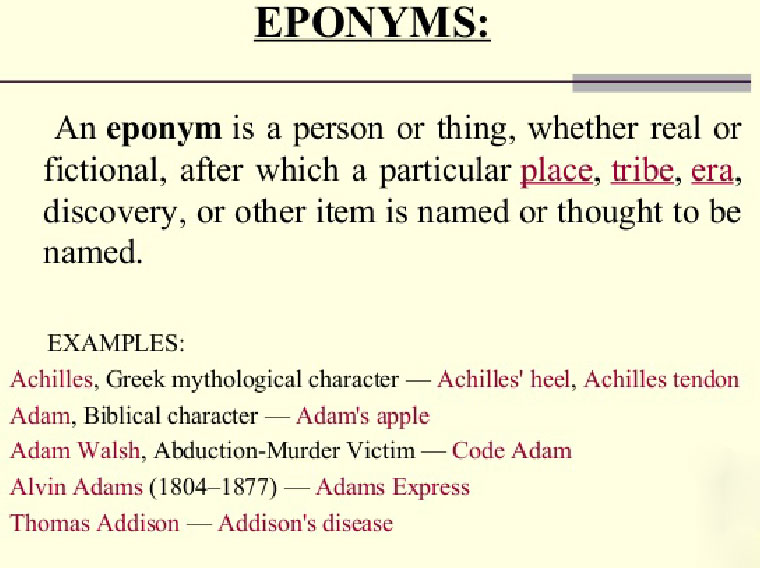In the name of EPONYMS
Eponym is a name/ noun formed after a person. It helps us remember important people in history who have contributed to shaping the human condition Roopa Banerjee
It’s common practice to honour a person by naming a street/institution after her, but highly uncommon to have a word named after an individual. Eponym is a name/ noun formed after a person. For instance, the Elizabethan age pertains to Queen Elizabeth I of England. Elizabethan is an eponym.
 The earliest recorded eponym dates back to the second millennium B.C, when the Assyrians named each year after a royal official appointed that year. Similarly, fifth-century Athens is known as The Age of Pericles, named after its most famous statesman.
The earliest recorded eponym dates back to the second millennium B.C, when the Assyrians named each year after a royal official appointed that year. Similarly, fifth-century Athens is known as The Age of Pericles, named after its most famous statesman.
In the modern world, many political trends were christened after politicians who set them. For example, Stalinism and Thatcherism. Many places — towns, cities or countries — are eponymously named. For example, Vancouver is named after explorer George Vancouver.
Medical jargon boasts many eponyms with several diseases/viruses named after the site where they were discovered. These are known as geographic eponyms in medicine. Some examples: Bombay Blood group, Jaipur Foot and Rocky Mountain Spotted Fever. Plaster of Paris was named after the French capital when medicos there began using plaster to mend broken bones.
Numerous verbs have also been derived from historical figures with their names linked with their ideas/innovations. The words boycott, chauvinist, quisling, and sandwich originate from personal names (Charles Boycott, Nicholas Chauvin, Major Vidkun Quisling and John Montagu, fourth Earl of Sandwich).
Not surprisingly, famous people are eponyms for their innovative apparel. Cardigan is eponymous with the Earl of Cardigan and raglan is derived from Lord Raglan who saw action in the Crimean War.
Unsurprisingly literature has inspired eponyms. It’s common to find eponymous terms in literary criticism such as Dickensenian for melodramatic poetry and eccentric characters, and Proustian for personal memories. Similarly, mythology has spawned many an eponym such as someone having the Midas touch, an Achilles’ heel and being Herculean or a Venus.
Scientists are often honoured for their innovations through linking their names with products — Rudolf Diesel, Alessandro Volta, and James Watt, or to processes (galvanism) or calculus (algorithm). Likewise, botanists have plants named after them, such as magnolia and poinsettia.
Alzheimer’s disease is named after its discoverer Dr. Alois Alzheimer, a German physician, who presented the case history of a 51-year-old woman who suffered from a rare brain disorder. Avogadro’s number is named after early 19th-century Italian scientist Amedeo Avogadro, who, in 1811, first proposed that the volume of a gas (at a given pressure and temperature) is proportional to the number of atoms or molecules irrespective of the nature of a gas.
It is common to have companies named after their founders. For instance when we refer to the eponymous founder of Ford Motor Company, we mean Henry Ford.
Words are formed in many ways. Eponyms help us remember important people in history who have contributed to shaping the human condition.
Exercise
Which of the following terms is not derived from a person’s name?
1. a. leotard b. cardigan c. tunic d. pompadour
2. a. guillotine b. shrapnel c. barbarian d. bloomers
Answer
1. c. Tunic
Leotard comes from Jules Léotard, cardigan comes from James Thomas Brudenell, 7th Earl of Cardigan, and pompadour comes from the Marquise de Pompadour.
2. c. barbarian
Bloomers are named after Amelia Bloomer, guillotine is named after Joseph Guillotin, and shrapnel after Henry Shrapnel.














Add comment